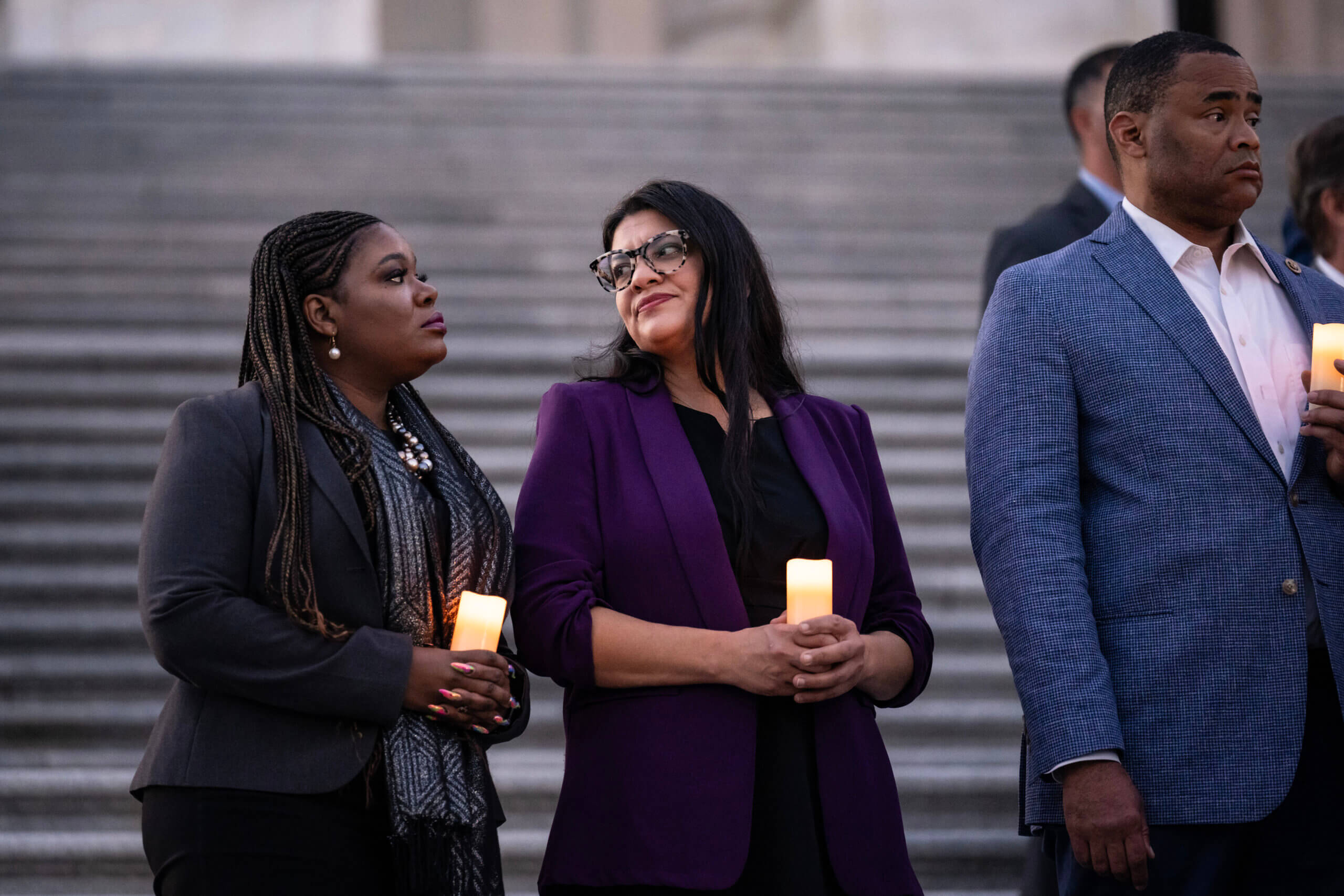How Jewish House members divided over the censure of Rashida Tlaib
Jerry Nadler, the House Jewish Caucus’ informal dean, cited free speech rights to explain his vote against the measure

Rep. Rashida Tlaib (D-Mich.) attends a bipartisan candlelight vigil to commemorate one month since the Oct. 7 Hamas attack. Photo by Drew Angerer/Getty Images
A group of 22 Democrats joined their Republican House counterparts Tuesday in censuring Rep. Rashida Tlaib, the only Palestinian American House member, for her recent comments on Israel. Among them were 10 Jewish members, who broke ranks with the majority of the 28-member Congressional Jewish Caucus. Among those who refused to censure Tlaib: the caucus’ informal dean, New York Rep. Jerry Nadler.
The vote reflected a growing division within the Democratic Party over U.S. support of Israel’s military campaign against Hamas in Gaza, in which thousands of Palestinians — Hamas officials say more than 10,000 — have been killed. It also sharply contrasted to a previous unified Democratic vote in January against a GOP measure that removed Rep. Ilhan Omar from the influential House Foreign Relations Committee over her comments on Israel.
The censure resolution, introduced by Rep. Rich McCormick, a Republican from Georgia, referenced a statement Tlaib made after the Oct. 7 Hamas attack on Israel, calling for the end of “the apartheid system that creates the suffocating, dehumanizing conditions that can lead to resistance.” She also repeated the anti-Israel phrase “From the river to the sea, Palestine will be free,” which many interpret as a call for the elimination of the Jewish state.
Explaining their votes
Nadler, the most senior Jewish House member, said he opposed the censure of Tlaib, of Michigan, because it undermines the constitutionally guaranteed freedom of speech. He called the measure “abuse or misuse of the powers of the House of Representatives.” Nadler’s statement echoed that of House Minority Leader Hakeem Jeffries, a staunch defender of the Israeli campaign against Hamas in Gaza. In a lengthy statement following the vote, Jeffries condemned Tlaib’s use of the slogan “from the River to the Sea” as “incitement to violence.” But he cautioned against “ad hominem attacks against colleagues,” saying it will “never accomplish” the objective of a two-state solution to the Israeli-Palestinian conflict.
Other Jewish Democrats pushed back against the idea that Tlaib’s comments should be protected under the First Amendment. “Tlaib has the right to say whatever she wants,” Rep. Brad Schneider of Illinois said in a statement, “but it cannot go unanswered.”
Rep. Dan Goldman, a freshman from New York whose district spans neighborhoods in Manhattan and Brooklyn and abuts Nadler’s, expressed a similar view. “As elected officials held to the highest integrity, we are bestowed with the public trust that confers a greater responsibility with the words we choose,” he said. Goldman said he reached out to Tlaib ahead of the House floor vote “to communicate to her the hurt and harm her words have caused and how they have been received by many in the Jewish community” and to urge her to clarify them.
“But she refused,” he said.
IfNotNow, a group opposed to Israel’s occupation of the West Bank, was set to protest outside Goldman’s office in the Park Slope neighborhood of Brooklyn on Wednesday evening over his vote to censure Tlaib. The group has joined other progressive advocacy organizations in recent weeks in public demonstrations against politicians who refuse to back a call for a cease-fire in Gaza. “This vote denies the humanity of Palestinians desperately trying to survive,” IfNotNow said in a statement ahead of the protest. “It also promotes growing attempts to silence pro-Palestinian voices.”
Last week, Nadler and Goldman said in a joint statement that Israel should consider “humanitarian pauses” in its military campaign against Hamas to allow the delivery of essential supplies and give Palestinian civilians time to relocate to safer areas.
Both Jewish House Republicans — Max Miller of Ohio and David Kutzoff of Tennessee — voted to censure Tlaib.
Last week Jewish Rep. Debbie Wasserman Schultz of Florida moved to formalize the Congressional Jewish Caucus, which includes 26 Democrats and two Republicans. “Some Jewish lawmakers feel an official caucus would give them greater representation in leadership decisions, but others think it would be difficult to organize all Jewish Democrats into one group,” Axios reported.






















